Now the fact that you and I may never have seen the words Xiang Qi does not stop it being the name of what is probably the world's most popular board game. It is more easily known to us as Chinese Chess, and may well be the origin of our own game, although it is more likely that there was an antecedent to both versions. Of course by using the word Chinese it shows at once how it gets to the number one popularity spot. It is said to be as ubiquitous in China as it is, here, in Vietnam, and that means it is everywhere: on streets, in parks, outside cafés, and in every house.
All attention devoted to their game of Xiang Qi with cigarettes and tea as inevitable companions
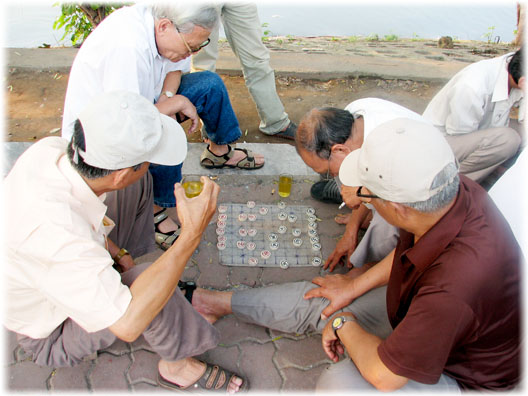 |
Blitz games are played in internet leagues; old men reflectively ponder a move in the shade of a cart, younger intellects play three simultaneous games for cash. A huddle of crouched figures anywhere, everywhere in Vietnam proclaims a game of Chinese Chess. The name Xiang Qi is in fact the Chinese for the game as used internationally - on the internet you can find a plethora of clubs to which you can join.
So the game has two aspects. It is a demanding intellectual pursuit just as Western Chess is demanding, but it is also a social focal point which brings people together and allows strangers to engage.
At Trúc Bạch Lakeside in Hà Nội
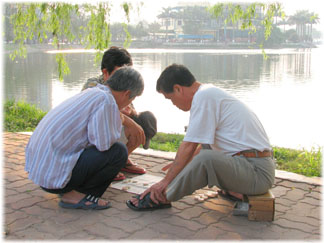 |
It has to be said that these social events are male dominated, women do play chess here, but not with the same conspicuously obsession of their male counterparts. It has a number of merits as a social activity. No cost at all is involved for the sets, for even if bought, and not home produced, they cost only a few pence. The location is any desirable shady spot where two or more interested parties can squat down and absorb themselves in the manoeuvres. Not that two people are a common sight.
For two players act like a magnet: a group forms at once. And it is not a passive group as it would be in the U.K. Here each of the watchers has the absolute right to interfere, a right exercised to the point of grabbing a piece from the active player and putting at a different location on the board! The exclamations and exchanges are vociferous and voluble.
The pieces for Xiang Qi: notice the river, the two courts and the way the pieces sit on the intersections
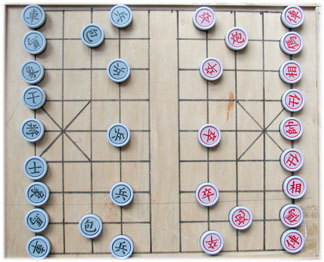 |
In keeping with this level of excitement is the placing of pieces, no finesse is allowed, they must be slammed down, often the hand being raised above the player's head and the whole board jumping in response. This animation is not induced by alcohol, but it is fuelled by the cigarettes, still so plentifully smoked here, and by the green tea which, if a number of games are underway will be dispensed by a tea seller who comes and attends for the 6p a glass it is likely to bring her. And the crowds can soon grow; 20, 30 or 40 people is not an unusual sight at popular spots.
And the game itself? Well it is at first glance rather like western chess. But there are superficial and awkward differences. Superficially it is different for it is played on the intersections of the squares in the same way as the Japanese game Go. And down the middle is a river which separates the two armies. The pieces themselves are usually plain plastic or wood discs like those that we use for draughts, but with the name of the piece inscribed as a black, or red character, for the two sides. Another obvious difference is that the Chinese game has a kind of court (or forbidden city?) in which the king and his two ministers are confined, even within these walls the points on which they can land are restricted. And inside his citadel he has no consort. In any case he is not a king, but a General.
A Chess set with its inevitable companion - a glass of tea
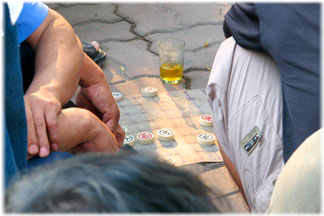 |
The reason for this last nomenclature is said to be that a Chinese Emperor, on hearing that the King had been beaten, executed the player responsible, and so the name was rapidly changed. The other pieces are similar in both games although the knight is subtly and importantly different as it can be blocked and cannot jump as freely in China as in the West. There is a reduction of court power in the eastern game which is redressed by having two pieces our game lacks.
These are cannons (or sometimes catapults) and take opposing pieces if and only if they can jump over another piece. This is a major difference for it does not come naturally to a western eye to watch for such jumps, and combined with unfamiliar rules about the exposure of the General the problem of what psychologists would call negative transfer are significant: what we have learnt previously interferes with our ability to learn the new game.
Play differs as a result of this rebalancing in a very significant way. Xiang Qi lends itself to both the familiar slow long games, but also to short fast games. These are what make it such a successful spectator sport for they often only last between 10 and 20 minutes, a terseness which lets those passing stop and engage.
Groups like this may attract 40 or more people daily
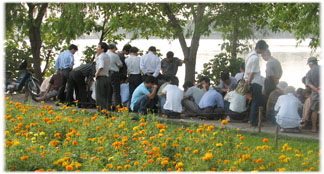 |
Also the internet allows the mechanisation of this type of fast play so that there are many leagues and tournaments played out in virtual space curiously a world away from the ancient game out of which they have grown. (For example the club you can join at:
"Club Xiang Qi" ) An interesting thought for those of us who would see our game as so intellectually important is that, whereas computers play western chess tolerably well, they do not yet engage at a high level with its eastern cousin, and they are not expected to do so for another three years! So although thoroughly integrated into modern information technology the social focus of this challenging game remains safe a while yet.

Go to the previous 'most recently added page'

